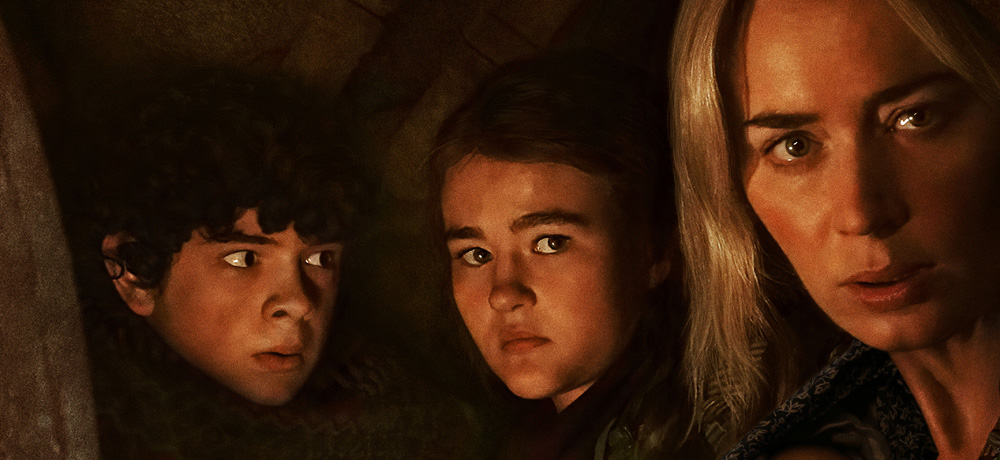






In the beginning moments of John Krasinski's A Quiet Place Part II we are placed in the past, on Main Street somewhere in Small-town, U.S.A. The Abbott family gathers at a Little League game for Marcus (Noah Jupe), who tentatively stands in batting position while fastballs whiz past him. Lee (John Krasinski) arrives a little late to the game, having to stop at a general store for snacks before sitting atop the bleachers with his daughter Regan (Millicent Simmonds). Suddenly, something strange happens; a large fiery object explodes and streaks across the cloudy skyline as the crowd scatters in confusion. Alien creatures crash onto the scene, smashing into vehicles and chasing down running humans. It's chaotic, scary, and emotional. It's also cinematic, a brilliantly executed introduction for this exciting sequel.
In A Quiet Place, the tension-filled horror origin story, the Abbott's survived the creature invasion by building a shelter, growing their food, and using sign language (their oldest child Regan is deaf) to communicate with each other. The arrival of a newborn baby, a brilliant character to introduce into a world that is ultimately supposed to remain silent, and the domino effect of decisions that call the monsters into play leads the family to abandon their shelter. Lee, making the heroic sacrifice, saves his children from death by offering himself to the alien beings.
A Quiet Place Part II takes place immediately following the events of the previous film. Evelyn (Emily Blunt) leads her children from their home and into the wilderness towards a signal fire that serves as the only beacon of hope for the mourning and traumatized family. Evelyn plays the role of sole protector for her family, carrying a newborn across her chest and trying to instill a level of comfort and safety for her older children. Emily Blunt is excellent in this role, combining emotions of disbelief and grief with grit and tenacity in the face of everything that is falling to pieces.
Krasinski demonstrates with this film a keen understanding of horror characteristics and, most impressively, the expectations that smart movie fans have for the genre. On numerous occasions, Krasinski will indicate that a scare is coming, whether through framing, with the exceptional immersive sound design, or with a shadow that feels out of place. Then, just as the audience thinks they grasp what is coming or how it might present, the big scare will come from a different location or with a different emotional emphasis.
Krasinski, who also wrote the film, does this manipulation of expectations with the narrative also. There is a sense of where this story is going, but figuring out how the start will meet the finish is composed of ingenious trips and traps. However, beyond these finely tuned moments of tension and terror is where Krasinski shines with the narrative, with the story of parents and children and the roles that shift and emerge as they continually grow in the apocalyptic landscape. The young actors Millicent Simmonds and Noah Jupe do a great job of embodying their characters' contrasting emotions at the beginning of the film. Where one is strong-willed and impulsive, the other is timid and cautious. As the film moves into a place where the children must fight for their future, the young characters become the focus of the action. It's an interesting transition that separates the sequel from its predecessor.
A Quiet Place Part II has a few noise-induced jump scares but again establishes its horror focus with a motive of tension-building driven by character and the bonds formed between them. There are only a few moments when the film loses track of its emotional core, mainly when the family must separate, but Krasinski masks this issue by ramping up the action and tension. When three separate stories converge during the finale, it's wholly cinematic and will have you on the edge of your seat.
Movie Score: 4/5